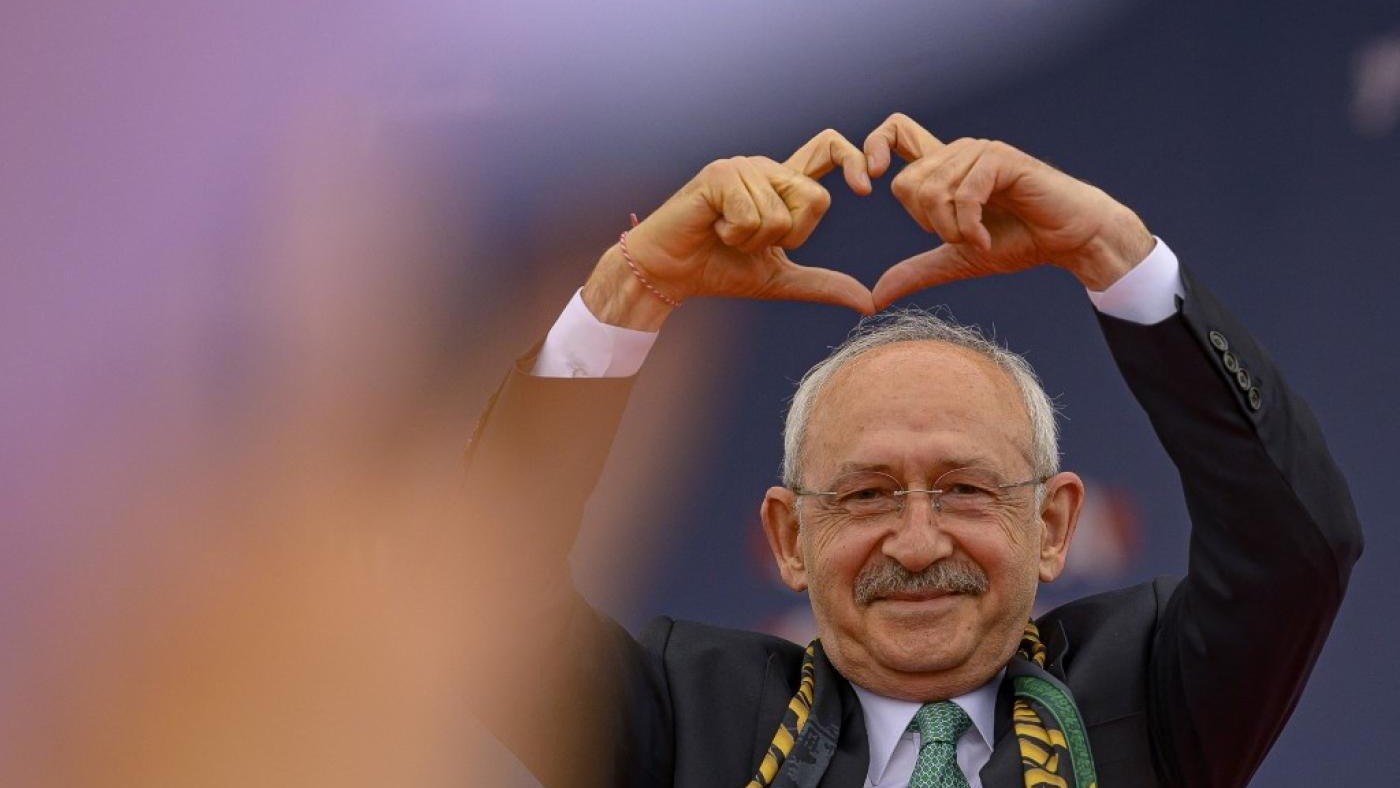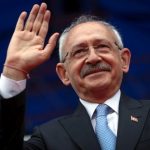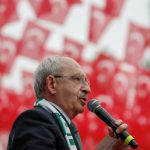Turkey’s top opposition candidate for president, Kemal Kilicdaroglu, resting in a hotel suite after addressing throngs of screaming supporters, said he would steer Turkey closer to NATO and the West if he wins Sunday’s election.
If Mr. Kilicdaroglu prevails, he says, he would breathe new life into Turkey’s democratic checks and balances after years in which incumbent President Recep Tayyip Erdogan jailed political opponents and reshaped the state to become the most powerful Turkish leader in a century.
Mr. Kilicdaroglu says he would strengthen Turkey’s role as linchpin of the North Atlantic Treaty Organization after Mr. Erdogan sought to build a closer relationship with Russian President Vladimir Putin. He also aims to revive Turkey’s bid to join the European Union.
The election could prove to be a historic moment, the opposition leader said.
“There are 5.3 million young people who will go to the ballot box for the first time and cast their votes and they want freedom and democracy,” Mr. Kilicdaroglu said Saturday in an interview, an hour after concluding a rally at dusk before a huge crowd of supporters on Istanbul’s Asian bank.
“This fact is very important for us, for Turkey, for the EU of which we are trying to be a member, and also for Western civilization,” he said.
Mr. Erdogan, who has led the country since 2003, sought to play all sides in the Russian invasion of Ukraine. He has worked to maintain a close relationship with Mr. Putin while selling weapons to Ukraine, in an attempt to further his goal of turning Ankara into a significant regional power broker. Previously he bought a Russian air-defense system over U.S. objections, and Washington has threatened to sanction Turkish companies and institutions for helping Russia evade Western sanctions.
Mr. Kilicdaroglu said that he would maintain Turkish investments in Russia but would comply with Western decisions with regard to sanctioning Russia, leaving Moscow more isolated than before.
“Turkey is a member of the Western alliance and NATO and Putin also knows this well,” he said. “Turkey must comply with decisions taken by NATO.”

Kemal Kilicdaroglu has the support of the CHP, Turkey’s largest opposition party.

Supporters of the top opposition candidate for president, Kemal Kilicdaroglu, at a rally.
Mr. Kilicdaroglu, the gray-haired 74-year-old leader of Turkey’s largest opposition party, holds at least a slight lead over Mr. Erdogan in most recent polls, though often short of the 50% threshold he would need for a first-round victory on Sunday, making a runoff against Mr. Erdogan likely.
Mr. Erdogan has dominated Turkish politics for two decades through his support among conservative and religious voters, but his power base is thinning. Voter discontent is high with Turkey’s struggling economy, allegations of corruption and abuse of power, and concerns about the government’s handling of the earthquakes in February that reduced cities to rubble.
Still, Mr. Kilicdaroglu faces a stiff challenge in converting discontent into electoral victory.
Mr. Erdogan has displayed a Rasputin-like ability to survive in the bare-knuckle world of Turkish politics since rising from Istanbul’s docklands to the presidential palace, crushing a military coup attempt and a series of challengers in past elections.
Mr. Kilicdaroglu, in contrast, led the Turkish opposition to a series of defeats as leader of the Republican People’s Party, or CHP, but he stuck with the task. In 2017 he led a protest march more than 260 miles from the capital to Istanbul to denounce one of Mr. Erdogan’s clampdowns on his opponents, and in 2019 there were signs that the political tide could be turning after the opposition party won control of the country’s two largest cities, Istanbul and Ankara, in mayoral elections.
Mr. Kilicdaroglu has also worked to overcome what is seen as one of the main weaknesses in his candidacy: a widespread perception that he lacks charisma and political cunning. Drawing huge crowds to his rallies and swiftly ending a revolt in which his coalition splintered in March, the leader has surprised some with the verve of his campaign.
“We are here today because we are tired of hunger, thieves, and corruption,” said Ayse Cuculoglu, a 77-year-old standing among a sea of people at Mr. Kilicdaroglu’s rally in Istanbul on Sunday. “God willing, he’s coming. We see him coming like a bomb,” she said of Mr. Kilicdaroglu.
In the crowd behind her someone held a handwritten sign saying: “I have one wish: That our wise sage will rule.”

Turkish opposition leader Kemal Kilicdaroglu, in white cap and dark pants, leading a protest march from Ankara to Istanbul in 2017.
Mr. Kilicdaroglu’s critics are many, including within his own political alliance, where his top coalition partner, center-right leader Meral Aksener, accused him of imposing his candidacy on the rest of the coalition and pushing aside candidates who had stronger poll numbers against Mr. Erdogan. Mr. Kilicdaroglu rejected the criticism and Ms. Aksener has since endorsed him.
Mr. Erdogan in recent days has amped up his rhetoric against Mr. Kilicdaroglu, calling his opponent “pro-LGBT” during a large rally in Istanbul on Sunday.
“We will not allow Kilicdaroglu, who walks with terrorist organizations, to divide this homeland,” Mr. Erdogan told a vast crowd of supporters. The same day, people hurled rocks at an opposition event in eastern Turkey, shattering the windows of a campaign bus and leaving people in the crowd outside bleeding from the head.
Mr. Kilicdaroglu is campaigning on promises to bring down the cost of living, return Turkey to a parliamentary system of government, restore independence to institutions such as the central bank, and release political prisoners. Amid a rise in anti-immigrant sentiment in Turkey, he has also promised to push millions of Syrian and Afghan refugees from the country, raising concerns among human-rights advocates. Mr. Erdogan has also vowed to return at least a million Syrians to their country.
“We are not being racists but we want these people to continue their lives in their own country, under better conditions,” Mr. Kilicdaroglu told the Journal.
Mr. Kilicdaroglu’s main achievement in the campaign might be in uniting the country’s disparate opposition factions in the single aim of unseating Mr. Erdogan, including conservative nationalists, Islamist defectors from the ruling party, liberals and Kurdish voters.
Turkey’s pro-Kurdish party isn’t officially part of the opposition’s six-party alliance, but the country’s most important Kurdish leader, jailed former presidential candidate Selahattin Demirtas, has thrown his weight behind Mr. Kilicdaroglu in a move that could decisively influence this year’s election.
With his electric speaking style, Mr. Demirtas was once considered a political threat to Mr. Erdogan, winning millions of votes in two presidential elections, including one in 2018 in which he campaigned from prison, where he is serving a sentence on charges of insulting the president—accusations he says are farcical. In a written interview from his prison cell, Mr. Demirtas said that a victory by Mr. Kilicdaroglu would open the possibility of him and other political prisoners being released.
“If Erdogan wins, Turkey will have transitioned into a sort of dictatorship,” he said.
By Jared MalsinFollow and Elvan Kivilcim
Source: WSJ



